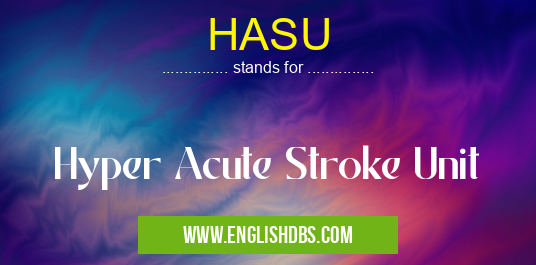What does HASU mean in THERAPEUTICS
HASU stands for Hyper Acute Stroke Unit. It is a specialized unit within a hospital that provides immediate and intensive care for patients who have suffered a stroke. The primary goal of a HASU is to minimize the damage caused by the stroke and to maximize the patient's chances of recovery.

HASU meaning in Therapeutics in Medical
HASU mostly used in an acronym Therapeutics in Category Medical that means Hyper Acute Stroke Unit
Shorthand: HASU,
Full Form: Hyper Acute Stroke Unit
For more information of "Hyper Acute Stroke Unit", see the section below.
» Medical » Therapeutics
What is a Hyper Acute Stroke Unit (HASU)?
A HASU is a specially designed unit within a hospital that provides comprehensive care for patients who have suffered a stroke. It is staffed by a team of highly trained healthcare professionals, including neurologists, nurses, and rehabilitation therapists. The unit is equipped with advanced medical technology, such as MRI scanners and CT scanners, to rapidly diagnose and treat strokes.
How Does a HASU Work?
Upon arrival at the HASU, patients are assessed by a team of doctors and nurses. The team will perform a physical examination, review the patient's medical history, and order imaging tests to determine the type and severity of the stroke. Treatment is then initiated immediately, typically involving medications to dissolve blood clots or reduce inflammation, as well as other supportive therapies.
Benefits of a HASU
- Rapid diagnosis and treatment: HASUs are equipped with advanced technology and a dedicated team of experts, allowing for rapid diagnosis and treatment of strokes, which is crucial for minimizing damage to the brain.
- Specialized care: HASUs provide specialized care tailored to the specific needs of stroke patients. This includes monitoring vital signs, administering medications, and providing rehabilitation therapy.
- Improved outcomes: Studies have shown that patients treated in HASUs have better outcomes than those treated in general hospital wards. This is due to the specialized care and early intervention provided in HASUs.
Essential Questions and Answers on Hyper Acute Stroke Unit in "MEDICAL»THERAPEUTICS"
What is a Hyper Acute Stroke Unit (HASU)?
HASU refers to a specialized medical unit within a hospital dedicated to providing immediate and comprehensive care for individuals experiencing acute stroke symptoms. HASU teams consist of highly trained healthcare professionals, including neurologists, stroke physicians, nurses, and therapists, who work together to deliver timely and effective treatment.
When should I seek care at a HASU?
Seeking immediate medical attention at a HASU is crucial if you or someone you know experiences symptoms suggestive of a stroke. These symptoms may include sudden onset of:
- Weakness or numbness on one side of the body
- Difficulty speaking or understanding speech
- Vision problems in one or both eyes
- Dizziness or loss of balance
- Severe headache with no known cause
What is the importance of rapid treatment for stroke?
Strokes are time-sensitive medical emergencies. Early intervention is vital to minimize brain damage and improve the chances of a positive outcome. HASUs are designed to provide prompt assessment, diagnosis, and treatment within the "golden hour" after stroke onset, the period when interventions have the greatest impact.
What treatments are available in a HASU?
HASUs offer a range of treatments tailored to the specific needs of each patient. These may include:
- Thrombolysis (administration of clot-busting medication)
- Thrombectomy (mechanical removal of blood clots)
- Antiplatelet therapy
- Anticoagulant therapy
- Neuroprotective measures
- Supportive care (e.g., oxygen therapy, blood pressure management)
What is the goal of HASU care?
HASU care aims to:
- Minimize brain damage by providing timely and appropriate treatment
- Improve functional outcomes and reduce the risk of disability
- Prevent future strokes through risk factor management
- Enhance the patient's quality of life and overall well-being
Final Words: HASUs play a vital role in the care of stroke patients by providing rapid diagnosis, specialized treatment, and rehabilitation. They have been shown to improve patient outcomes and reduce the long-term effects of stroke. The availability of HASUs has significantly improved the prognosis for stroke patients and has contributed to a better quality of life for survivors.
HASU also stands for: |
|
| All stands for HASU |
